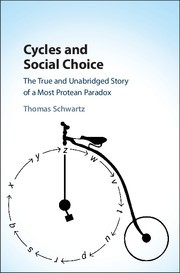
Cycles and Social Choice: The True and Unabridged Story of a Most Protean Paradox
Thomas Schwartz
The centuries-old paradox of voting is that majorities sometimes prefer x to y, y to z, and z to x – a cycle. The discovery of the sources and consequences of such cycles, under majority rule and countless other regimes, constitutes much of the mathematical theory of voting and social choice. This book explores the big questions posed by the paradox of voting: positive questions about how to predict outcomes and explain observed stability, and normative questions about how to hold elections, how to take account of preference intensities, the relevance of social welfare to social choice, and challenges to formal ‘rationality’, individual and social. The overall lesson is that cycles are facts, ubiquitous, and consequential in non-obvious ways, not puzzles to be solved, much less maladies or misfortunes to be avoided or regretted.
- Examines the sources and consequences of cycles and instability in the mathematical theory of voting and social choice with more numerous and varied sources and consequences of cycles and instability than those found in any other book
- This book is more simple and succinct, and yet more rich and accurate, than other books on social choice
- Includes many new and surprising results which should fascinate economists, philosophers, applied mathematicians, and especially political scientists

